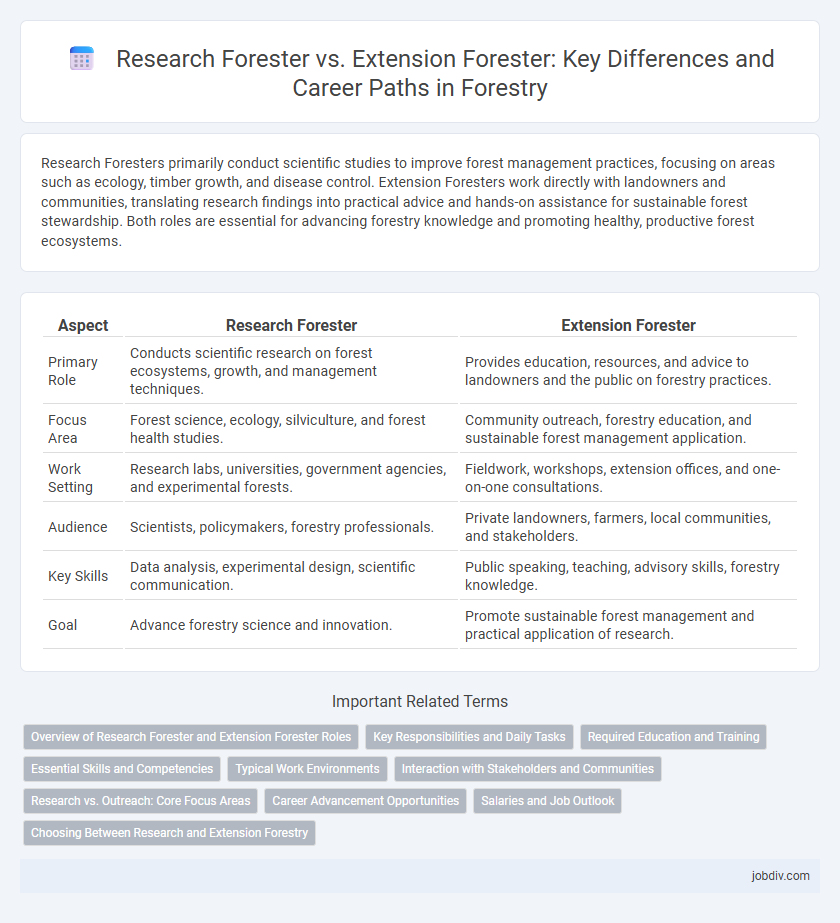Research Foresters primarily conduct scientific studies to improve forest management practices, focusing on areas such as ecology, timber growth, and disease control. Extension Foresters work directly with landowners and communities, translating research findings into practical advice and hands-on assistance for sustainable forest stewardship. Both roles are essential for advancing forestry knowledge and promoting healthy, productive forest ecosystems.
Table of Comparison
| Aspect | Research Forester | Extension Forester |
|---|---|---|
| Primary Role | Conducts scientific research on forest ecosystems, growth, and management techniques. | Provides education, resources, and advice to landowners and the public on forestry practices. |
| Focus Area | Forest science, ecology, silviculture, and forest health studies. | Community outreach, forestry education, and sustainable forest management application. |
| Work Setting | Research labs, universities, government agencies, and experimental forests. | Fieldwork, workshops, extension offices, and one-on-one consultations. |
| Audience | Scientists, policymakers, forestry professionals. | Private landowners, farmers, local communities, and stakeholders. |
| Key Skills | Data analysis, experimental design, scientific communication. | Public speaking, teaching, advisory skills, forestry knowledge. |
| Goal | Advance forestry science and innovation. | Promote sustainable forest management and practical application of research. |
Overview of Research Forester and Extension Forester Roles
Research Foresters conduct scientific studies to develop sustainable forest management practices, focusing on ecosystem health, timber productivity, and biodiversity conservation. Extension Foresters translate research findings into practical applications, providing education and technical assistance to landowners, forest managers, and communities. Both roles are crucial for advancing forestry knowledge and promoting sustainable forest use through collaboration between science and stakeholder engagement.
Key Responsibilities and Daily Tasks
Research Foresters focus on designing and conducting scientific studies to understand forest ecosystems, tree growth, pest management, and the effects of climate change on forestry resources, often working in laboratories or field stations. Extension Foresters primarily engage with landowners, communities, and industry professionals to provide education, technical assistance, and practical advice on forest management, conservation practices, and sustainable timber production. While Research Foresters analyze data and publish findings to advance forestry science, Extension Foresters translate this research into actionable strategies and outreach programs to enhance forest stewardship.
Required Education and Training
Research Foresters typically require advanced degrees such as a master's or PhD in forestry or natural resources, emphasizing specialized knowledge in forest ecology, silviculture, and forest management research methods. Extension Foresters often hold a bachelor's or master's degree with a focus on applied forestry and community engagement, combined with training in outreach, education, and communication skills to assist landowners and stakeholders. Both roles demand coursework in forest biology, resource management, and data analysis, but Research Foresters prioritize scientific research competencies while Extension Foresters emphasize practical application and public service.
Essential Skills and Competencies
Research Foresters excel in analytical skills, scientific knowledge, and proficiency in data collection and experimental design to develop sustainable forest management practices. Extension Foresters demonstrate strong communication, community engagement, and educational skills to effectively transfer research findings to landowners, stakeholders, and the public. Both roles require expertise in forestry principles, ecosystem management, and policy understanding, but differ in application focus--research-driven innovation versus practical outreach and implementation.
Typical Work Environments
Research Foresters primarily work in academic institutions, government agencies, and research organizations where they conduct field studies, analyze forest ecosystems, and develop sustainable management practices. Extension Foresters operate mainly within community settings, forestry service offices, and outreach programs, providing education and technical assistance to landowners, forest managers, and local stakeholders. Both roles may involve outdoor fieldwork, but Research Foresters focus on scientific data collection while Extension Foresters prioritize practical application of forestry knowledge.
Interaction with Stakeholders and Communities
Research Foresters collaborate closely with scientific institutions and government agencies to develop data-driven forestry practices that address ecological sustainability and resource management. Extension Foresters engage directly with local landowners, community groups, and industry stakeholders, translating research into practical guidance and educational programs to promote sustainable forestry at the grassroots level. Both roles prioritize stakeholder involvement, with Research Foresters focusing on knowledge generation and Extension Foresters emphasizing knowledge dissemination and community support.
Research vs. Outreach: Core Focus Areas
Research Foresters prioritize scientific studies to develop sustainable forest management techniques and enhance ecological understanding, often working within laboratories or field experiments. Extension Foresters emphasize outreach by translating research findings into practical applications, providing education and resources directly to landowners, communities, and industry stakeholders. This distinction ensures research generates knowledge while extension services facilitate its effective implementation on the ground.
Career Advancement Opportunities
Research Foresters specialize in scientific studies to develop sustainable forest management practices, often advancing to roles in academia, government agencies, or private research organizations. Extension Foresters apply research findings in community education and landowner support, progressing toward leadership positions in cooperative extension services or regional forestry programs. Career advancement for Research Foresters emphasizes technical expertise and innovation, while Extension Foresters build influence through outreach and stakeholder engagement.
Salaries and Job Outlook
Research Foresters typically earn higher salaries due to their specialized roles in conducting scientific studies and developing forest management technologies, with median annual wages often ranging from $60,000 to $90,000 depending on experience and education level. Extension Foresters focus on community outreach and education, facilitating the transfer of research to practical applications, and usually have salaries between $50,000 and $75,000. The job outlook for both positions remains stable, driven by increasing demands for sustainable forest management and conservation efforts, with Research Foresters experiencing slightly faster growth rates due to expanding environmental research funding.
Choosing Between Research and Extension Forestry
Choosing between Research Forester and Extension Forester roles depends on career goals and interests in forestry science versus community engagement. Research Foresters focus on advancing scientific knowledge through field studies, data analysis, and forest ecosystem modeling, contributing to sustainable forest management and conservation. Extension Foresters prioritize applying research findings to educate landowners, promote best practices, and support local forestry operations, enhancing practical forest stewardship and resource management.
Research Forester vs Extension Forester Infographic

 jobdiv.com
jobdiv.com